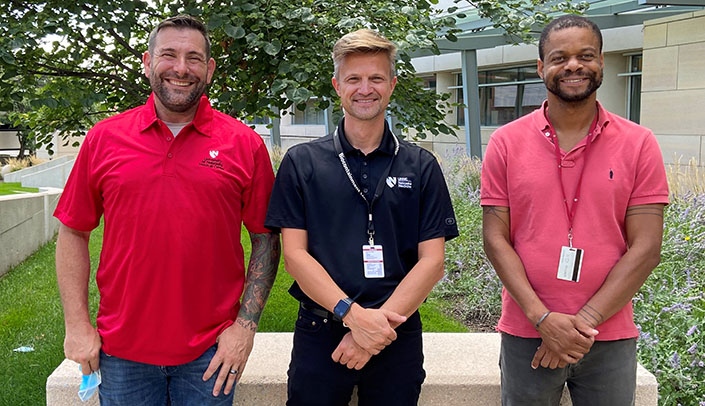UNMC was first to report the presence of intact, culturable SARS-CoV-2 virus in small particles exhaled by COVID-19 patients in a July 2020 preprint report of initial data gathered at Nebraska Medicine. Now, in August 2021, UNMC’s findings on airborne transmission have passed scientific peer review and been accepted for publication by Nature’s Journal of Exposure Science & Environmental Epidemiology.
Over the last year, most people have come to accept the fact the SARS-CoV-2 virus is spread through particles in the air exhaled by people with the disease. However, the concept of airborne or aerosol, transmission of SARS-CoV-2 was not immediately widely accepted. The World Health Organization (WHO) first insisted it spread by "droplets." Initial reports out of Asia were inconclusive.
But the possibility – probability – of airborne transmission "was probably the most urgent question we had in the beginning," said Joshua Santarpia, PhD, associate professor of pathology and microbiology, and research director, chemical and biological programs, National Strategic Research Institute (NSRI). Dr. Santarpia is one of three UNMC co-principal investigators on the study, with St. Patrick Reid, PhD, and John-Martin Lowe, PhD.
Capturing air samples
The scientific team captured and worked from air samples in and around the rooms of patients hospitalized with COVID-19 in the Omaha area. The work was "part of a quality assurance/quality improvement study on isolation care." This project did not constitute human subject research, as only the environment was studied, not patients.
And when they checked? "We found pervasive evidence of SARS-CoV-2 in aerosols," Dr. Santarpia said.
Now, they’ve shown replicating virus in air particles smaller than a micron – one-thousandth of a millimeter.
So, what does this mean? "The best way to protect yourself from COVID-19 is using high-quality respiratory protection," Dr. Santarpia said. The better quality the mask, the more you are protected. Cloth masks will be helpful, but you shouldn’t consider them "a cure." Properly worn surgical masks are good in most situations. Most leading clinicians and scientists, including at UNMC, recommend masks to help diminish the spread of COVID-19.
"Air movement is helpful," Dr. Santarpia said. "High-efficiency filtration is extremely helpful."
And, he said, "you have a lot working for you outdoors that you don’t have working for you inside." Sunlight can kill SARS-CoV-2.
The idea that singing or talking loudly can lead to spread lines up with what UNMC has learned.
Same with the concept of "super spreaders." Some people naturally produce more particles.
UNMC does not yet have aerosol data on the delta variant. But the research team is working on that now.
The research was conducted by an interdisciplinary team (see sidebar) from UNMC, its Global Center for Health Security, the NU-affiliated National Strategic Research Institute (NSRI) sponsored by U.S. Strategic Command, the University of Nebraska at Omaha, University of Illinois and Massachusetts General Hospital.

I look forward to some day when we can do the air sampling and include the human studies. That is where the money is on these conclusions. Otherwise, they can have the opposite effect we want…making people afraid to even leave their homes. The whole chain of infection needs to be observed. Thank you all for this first step.
Congratulations on your project! I look forward to hearing more from your on-going environmental studies.
This work is awesome!!!! Thank you much for continuing this to answer our questions about how this virus will continue to effect us in the future.
Congratulations! Thank you for this important science helping to mitigate the pandemic.
The more we know the better we can protect ourselves. Thank you for your work and continuing investigations.
Congratulations! This is very important work!